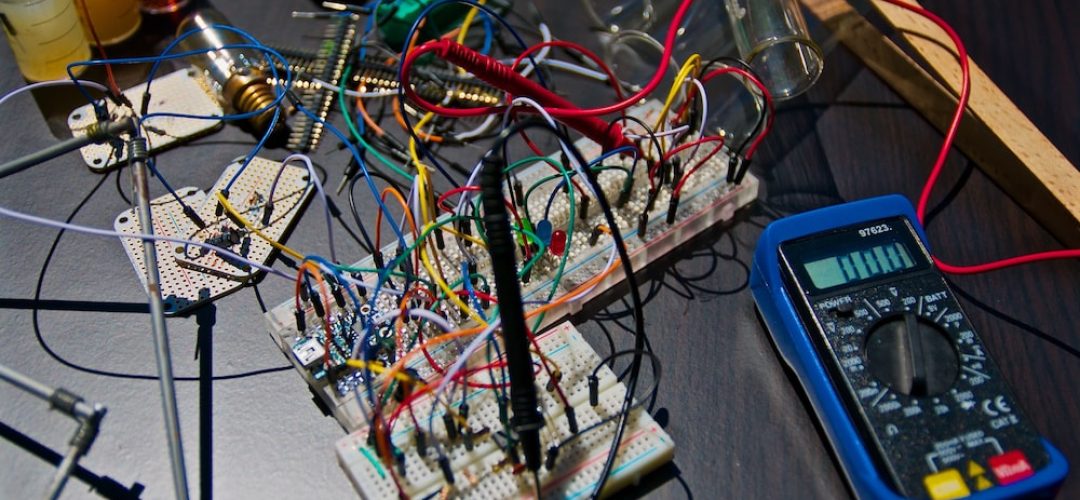Electrical and Electronics Engineering

Electrical and Electronics Engineering is a multidisciplinary field that combines principles of electrical engineering and electronics to design, develop, and maintain electrical systems and devices. This course provides a comprehensive understanding of electrical circuits, electronics, power systems, control systems, and communication systems. Students will learn to apply mathematical and scientific principles to analyze, design, and troubleshoot electrical and electronic systems.
Our Electrical and Electronics Engineering qualifications have been designed in collaboration with colleges, higher education institutions, and sector skills councils. They offer a pathway for individuals to progress to university degrees and cover Diploma Level- 3 to 7.
These qualifications provide the flexibility for learners to choose from a variety of optional units at each level. This allows them to specialize in specific areas while also gaining the essential core knowledge necessary for all managers.
- Develop a solid foundation in electrical and electronics engineering principles, theories, and fundamental concepts.
- Acquire a comprehensive understanding of electrical circuits, electronic devices, power systems, control systems, and communication systems.
- Develop proficiency in using mathematical and scientific principles to analyze, design, and troubleshoot electrical and electronic systems.
- Gain hands-on experience in designing and implementing electrical and electronic circuits and systems through laboratory experiments and projects.
- Understand the principles and techniques of power generation, transmission, and distribution, including renewable energy systems.
- Develop skills in control systems design, including feedback control theory, system modeling, and industrial automation.
- Explore the principles of analog and digital communication systems, modulation techniques, wireless communication, and network protocols.
- Foster critical thinking, problem-solving, and analytical skills to solve complex engineering problems in electrical and electronics engineering.
- Enhance teamwork, communication, and project management skills through collaborative projects and assignments.
- Develop research skills and the ability to apply knowledge to conduct independent research in specialized areas of electrical and electronics engineering.
After finishing the Sustainability and Environmental Science program, individuals have the opportunity to explore diverse career avenues across multiple sectors. Potential professional pathways encompass roles such as sustainability specialist, environmental scientist, ecological researcher, climate analyst, renewable energy consultant, conservation manager, environmental policy analyst, and green technology innovator. Graduates might secure positions within environmental organizations, private enterprises, research consultancies, sustainable development firms, or governmental bodies. Moreover, they might opt to advance their education through postgraduate studies in related fields.
Course Details

Level 3- National Diploma in Electrical and Electronics Engineering
Course Overview:
The Level 3- National Diploma in Electrical and Electronics Engineering is a comprehensive program that provides students with a strong foundation in the field. The course covers both electrical and electronics engineering principles, including topics such as circuit analysis, electrical machines, digital electronics, power systems, and more. Students will develop practical skills through hands-on laboratory work and gain theoretical knowledge through classroom lectures. The diploma equips students with the necessary skills to pursue a career in the electrical and electronics engineering industry.
Equivalences:
The Level 3- National Diploma in Electrical and Electronics Engineering is equivalent to an A-level qualification in the UK education system. It is also comparable to a Level 3 diploma or certificate in other international qualifications frameworks.
Course Contents:
The course content of the Level 3- National Diploma in Electrical and Electronics Engineering typically covers a range of advanced topics. Here are the topics covered:
- Electrical Principles and Circuits
- Electronic Devices and Circuits
- Electrical Machines and Drives
- Power Systems and Distribution
- Communications Systems
- Engineering Mathematics
Assignment Criteria:
The qualification assessment criteria are based on assignments, but in order to pass, the learner must complete all of the unit’s learning requirements. At the completion of each unit, an interview will be held as proof that the work truly belongs to the learner.
Entry Requirements:
The specific entry requirements for the Level 3- National Diploma in Electrical and Electronics may include:
- A minimum age requirement (e.g., 16 years old)
- Completion of O-level/ 10th Standard or equivalent qualifications.
- Completion of a relevant Level 2 qualification in Electrical and Electronics Engineering or a related subject.
- English language proficiency, demonstrated through language tests or previous education in an English-speaking environment.
Course Duration:
The qualification has recommended course duration of 1 year.
Note: However the course duration may be increased to meet additional learning needs if required.
Level 4- Extended Diploma in Electrical and Electronics Engineering
Course Overview:
The Level 4- Extended Diploma in Electrical and Electronics Engineering is an advanced program that builds upon the foundational knowledge gained in the Level 3 diploma. This course focuses on developing specialized skills and in-depth understanding of electrical and electronics engineering principles. Students will explore advanced topics such as power electronics, control systems, telecommunications, embedded systems, and more. The diploma equips students with the expertise required to design, analyze, and troubleshoot complex electrical and electronics systems.
Equivalences:
The Level 4- Extended Diploma in Electrical and Electronics Engineering is comparable to a Higher National Certificate (HNC) or the first year of a bachelor’s degree in the UK education system. It is also similar to a Level 4 diploma or certificate in other international qualifications frameworks.
Course Contents:
The course content of the Level 4- Extended Diploma in Electrical and Electronics Engineering typically covers a range of advanced topics. Here are the topics covered:
- Electrical Principles and Circuit Analysis
- Power Electronics and Drives
- Control Systems Engineering
- Digital Signal Processing
- Communication Systems
- Renewable Energy Systems Integration
- Project Management and Professional Practice
Assignment Criteria:
The qualification assessment criteria are based on assignments, but in order to pass, the learner must complete all of the unit’s learning requirements. At the completion of each unit, an interview will be held as proof that the work truly belongs to the learner.
Entry Requirements:
The specific entry requirements for the Level 4- Extended Diploma in Electrical and Electronics Engineering are included:
- Minimum age requirements (usually 18 years or older).
- Completion of A-level/ 12th Standard or equivalent qualifications.
- Completion of a Level 3 qualification in Electrical and Electronics Engineering or a related field may be required by some institutions.
- English language proficiency, demonstrated through language tests or previous education in an English-speaking environment.
Course Duration:
The qualification has recommended course duration of 1 year.
Note: However the course duration may be increased to meet additional learning needs if required.
Level 5- Higher National Diploma in Electrical and Electronics Engineering
Course Overview:
The Level 5- Higher National Diploma in Electrical and Electronics Engineering is an advanced program designed to further enhance the knowledge and skills of students in the field of electrical and electronics engineering. This course delves into complex and specialized areas, including advanced control systems, power system analysis, communication networks, renewable energy systems, and more. Students will develop advanced problem-solving abilities, critical thinking skills and the ability to design and implement sophisticated electrical and electronics systems.
Equivalences:
The Level 5- Higher National Diploma in Electrical and Electronics Engineering is comparable to a Higher National Diploma (HND) or the second year of a bachelor’s degree in the UK education system. It is also similar to a Level 5 diploma or certificate in other international qualifications frameworks.
Course Contents:
The course content of the Level 5- Higher National Diploma in Electrical and Electronics Engineering typically covers a range of advanced topics. Here are the topics covered:
- Advanced Control Systems Engineering
- Power System Analysis and Design
- Electrical Power Utilization and Distribution
- Advanced Electronics and Instrumentation
- Digital Systems Design
- Renewable Energy System Design and Integration
- Electromagnetic Field Theory
- Engineering Mathematics and Statistics
- Research Methods and Project Management
Assignment Criteria:
The qualification assessment criteria are based on assignments, but in order to pass, the learner must complete all of the unit’s learning requirements. At the completion of each unit, an interview will be held as proof that the work truly belongs to the learner.
Entry Requirements:
The specific entry requirements for the Level 5- Higher National Diploma in Electrical and Electronics Engineering may include:
- Minimum age requirements (usually 18 years or older).
- A Level 4 diploma or year 1 of bachelor’s degree or any equivalent overseas qualification in Electrical and Electronics Engineering or a related field.
- Proficiency in mathematics, physics, and relevant engineering principles.
- English language proficiency, demonstrated through language tests or previous education in an English-speaking environment.
Course Duration:
The qualification has recommended course duration of 18 Months.
Note: However the course duration may be increased to meet additional learning needs if required.
Level 6- International Diploma in Electrical and Electronics Engineering
Course Overview:
The Level 6- International Diploma in Electrical and Electronics Engineering is an advanced program that focuses on developing advanced technical knowledge, research skills, and leadership abilities in the field of electrical and electronics engineering. This course aims to equip students with the expertise required to solve complex engineering problems, design innovative systems, and lead engineering projects. Students will explore advanced topics such as power system optimization, control engineering, wireless communication, advanced electronics, and more.
Equivalences:
The Level 6- International Diploma in Electrical and Electronics Engineering is comparable to the final year of a bachelor’s degree in the UK education system. It is also similar to a Level 6 diploma or certificate in other international qualifications frameworks.
Course Contents:
The course content of the Level 6- International Diploma in Electrical and Electronics Engineering typically covers a range of advanced topics. Here are the topics covered:
- Advanced Power Electronics
- Compound Semiconductor and Hetero-Junction Devices
- High Voltage Engineering
- Optoelectronic devices
- Wireless Communication Systems
- Digital Signal Processing and Image Processing
- Data Communication and Computer Networks
- Nuclear Power Engineering
- Complex Variable and Mathematical Methods
Assignment Criteria:
The qualification assessment criteria are based on assignments, but in order to pass, the learner must complete all of the unit’s learning requirements. At the completion of each unit, an interview will be held as proof that the work truly belongs to the learner.
Entry Requirements:
The course content of the Level 6- International Diploma in Electrical and Electronics Engineering typically may include:
- Minimum age requirements (usually 20 years or older).
- A Level 5 diploma or year 2 of bachelor’s degree or any equivalent overseas qualification in Electrical and Electronics Engineering or a related field.
- English language proficiency, demonstrated through language tests or previous education in an English-speaking environment.
Course Duration:
The qualification has recommended course duration of 18 Months.
Note: However the course duration may be increased to meet additional learning needs if required.
Level 7- Post Graduate Diploma in Electrical and Electronics Engineering
Course Overview:
The Level 7- Post Graduate Diploma in Electrical and Electronics Engineering is an advanced program designed for professionals seeking to enhance their expertise and leadership skills in the field of electrical and electronics engineering. This course focuses on advanced theoretical concepts, research methodologies, and complex problem-solving techniques. Students will delve into topics such as advanced power system analysis, advanced control systems, signal processing, advanced telecommunications, and more. The diploma equips students with the knowledge and skills necessary to lead engineering projects, engage in research, and drive innovation in the field.
Equivalences:
The Level 7- Post Graduate Diploma in Electrical and Electronics Engineering is comparable to a Master’s degree or a Postgraduate Diploma in the UK education system. It is also similar to a Level 7 diploma or certificate in other international qualifications frameworks.
Course Contents:
The course content of the Level 7- Post Graduate Diploma in Electrical and Electronics Engineering typically covers a range of advanced topics. Here are the topics covered:
- Advanced Power System Analysis and Planning
- Advanced Control Systems and Automation
- Advance Signal Processing and Data Analysis
- Advanced Telecommunications and Networking
- Advanced Digital Systems Design and VHDL Programming
- Advanced Power Electronics and Renewable Energy Systems
- High Voltage Engineering and Insulation Coordination
- Advanced Electrical Machine Design and Optimization
- Advanced Electronics and Instrumentation Techniques
- Research Methods and Experimental Design
Assignment Criteria:
The qualification assessment criteria are based on assignments, but in order to pass, the learner must complete all of the unit’s learning requirements. At the completion of each unit, an interview will be held as proof that the work truly belongs to the learner.
Entry Requirements:
The specific entry requirements for the Level 7- Post Graduate Diploma in Electrical and Electronics Engineering may include:
- A minimum age requirement (e.g., 22 years old)
- A complete Bachelor’s degree, UK level 6 diploma or an equivalent overseas qualification in Electrical and Electronics Engineering or a related field.
- Proficiency in mathematics, physics, and relevant engineering principles.
- English language proficiency, demonstrated through language tests or previous education in an English-speaking environment.
Course Duration:
The qualification has recommended course duration of 2 years.
Note: However the course duration may be increased to meet additional learning needs if required.

